
 |
||||||||||||||||
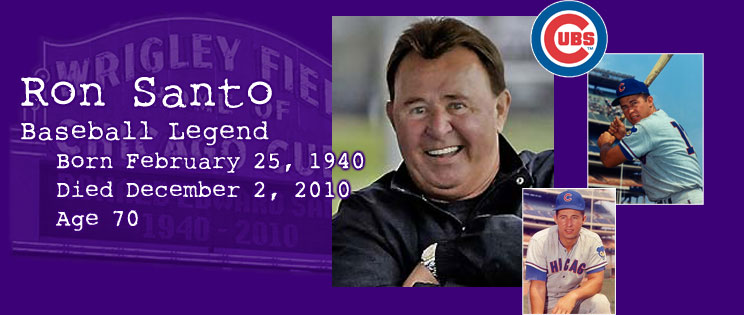 |
||||||||||||||||
| That's why I say if everybody went to heaven Hey-ey-ey, I believe I'd miss the call But you see if it wasn't for bad luck, Trying to tell you son if it wasn't for bad luck, now now Oh, oh, I wouldn't have no luck at all Would you believe I wouldn't have no luck at all |
||||||||||||||||
— Ray Charles |
||||||||||||||||
As a 17-year-old, he was offered an $80,000 bonus to sign with the Cincinnati Reds. The Yankees offered him a tryout, the Cleveland Indians offered him $50,000 to sign with them. He turned it all down to sign for $20,000 with the Chicago Cubs. After that, you just kind of knew it was going to go downhill for Ron Santo, who has died at 70. This guy had the worst luck. His father, who was an alcoholic, left his mother a year after he was born; his mother remarried, and she and his stepfather were killed in an automobile accident while they were driving to see him play baseball. One of his best friends in baseball, Kenny Hubbs, was killed in a plane crash; he was diagnosed with juvenile diabetes when he took his first baseball physical; no one knows exactly how much money his diabetes charity earned; one at a time they lopped off his legs at the knee; he had several heart attacks and, finally, quadruple-bypass surgery; he played most of his career for the Cubs, who gave his #10 uniform number to Dave Kingman; he was not a very attractive man, and then ... bladder cancer. For thirty-five years, the North Side of Chicago has been wringing its hands and wailing for Ron Santo's induction into the Baseball Hall of Fame. The Hall of Fame for a guy the Cubs thought so little of that they gave his jersey number to Dave I-Suck-Horribly Kingman? Yeah. That'll happen — when the Cubs win the World Series, which won't happen until pigs fly. But Ron Santo isn't the only one with bad luck ... Consider Erik, who had the late third baseman on his deadpool list, only to switch him out for a half-assed politician. So instead of a triple, we turn two with Chaptal and Kathi. They each get eight points for this late-inning hit and three apiece as a bonus. Total: 11. — Bill Schenley |
||||||||||||||||
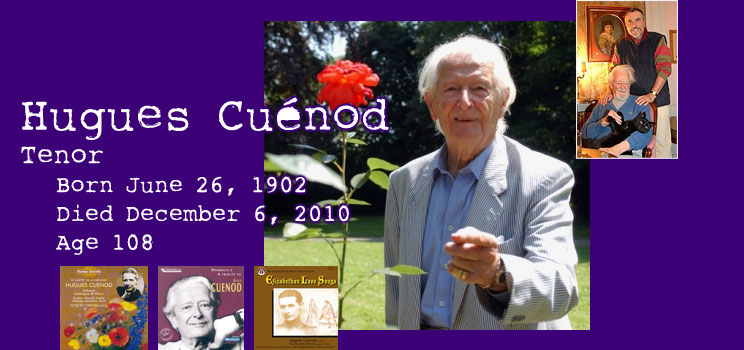 |
||||||||||||||||
108 (or so) years of pronouncing your name to folks. Imagine that. According the NY Times, "his given name is pronounced 'oog,' in an umlauted way — say 'eeg' with lips rounded — his surname 'kweh-NOH.'" 108 (or so) years of a remarkable career. For fun, let's start in 1987. The Swiss tenor was on stage as Emperor Altoum in Puccini's Turandot with Placido Domingo, conducted by James Levine, directed by Franco Zeffirelli. And with all those names, he was the story. Made his Metropolitan Opera debut when he was 85, the oldest person to sing there ever. You know what they say (or sing): If you can make it here, you can make it anywhere. Except he had already made it. Everywhere. He made his operatic debut some 60 years earlier in Paris. He sang in '30s recordings conducted by Nadia Boulanger. He sang the role of Sellem in the world premiere of Stravinsky's The Rake's Progress. He performed in all the famous opera venues in Europe. He taught at the Geneva Conservatory, gave master classes around the world, and sang on Broadway. He performed every composer of every century, a champion of both early music and dissonant 20th century. Oh yeah, he entered into a civil union when he was 104 with a lad 40 years his junior. A life certainly well lived, every minute of 108 years. Constant Irritant gets the hit. That's 1 small point for his age, but 5 nice points for the solo. Total: 6. Bravo. — Amelia |
||||||||||||||||
 |
||||||||||||||||
There's a Roz Chast cartoon. Someone is reading the obituary page of a newspaper. The headlines are something like "Younger than You," "Your Age Exactly," you get the idea. It's all relative. Funny, yes? Funny, yes. And yet, and yet, it's dispiriting to hear of the death of someone like Elizabeth Edwards, not merely because you liked her, or liked what she stood for, or what she put up with. But because you have, or had, the same illness. When she announced that there was a recurrence, I was so upset that I got up from my desk at work and took a very long walk. I ended up in a bookstore and read a novel there. I didn't go back to work for hours. It's ridiculous, of course, because every case is different pathologies, nodal involvement ... you can't rationally compare yourself to anyone with the same disease, which is why when someone tells you that their mother had it and you'll be fine, you just want to tell them how meaningless the comment is. But who said it was rational? I asked the oncology nurse at my doctor's office whether patients get needier when celebrities come out with this news, or they die. The phone rings more, she said. That's all. But then you forget, because she's being treated and they're so confident and upbeat and the husband feels he can fool around. Somehow you think she will go on and on. Breast cancer is either curable or treatable. And then she dies. We're so cavalier here at alt.obituaries about death. We make puns, for chrissakes. And I think partly it's because we reject the notion of our own deaths. Nothing healthier than that. But, every once in a while, a death hits you hard. Maybe it's your favorite singer or director. Or maybe it's someone who died unexpectedly. (Jill Clayburgh gets my vote for this year.) Or maybe it's someone who you figure was going about their life in the same way you are but somehow took a wrong turn and ended up on the obituary page. With Your Disease Exactly. Chipmunk Roasting, Deceased Hose, Deepstblu, Denise, Direcorbie, EdV, Erik, Eternity Tours, King Daevid, Koko-Moxie (first hit of the year!), Mark, Morris the Cat, Ray Arthur and The Wiz. 11 points each. — Amelia |
||||||||||||||||
 |
||||||||||||||||
This is wild. I've been putting off and putting off some more doing the update on Neva Patterson, because I figured who the hell knows who Neva Patterson is. Finally tonight I decide to do it, and I google her and there's a photo and I know exactly who she is! I love Neva Patterson. She was a terrific character actress. She was an important part of my wasted youth. She was in a million films, Broadway plays, television plays and TV shows. She was a Republican in All The President's Men. She was Buddy Holly's mother. She was Cary Grant's fiancee in An Affair to Remember, one of the dumbest movies ever made. (You couldn't pick up a phone and tell him you were in an accident?? He should have married Neva.) All that bad and some good TV: The Defenders (the one with E.G. Marshall), St. Elsewhere, The Dukes of Hazzard, The Governor and JJ, The Patty Duke Show, Naked City, Ben Casey, Cagney and Lacey. Do you have any idea how many hours I wasted with this stuff? (Probably you do.) So an apology is in order to Garrett, who gets the solo and who very nearly got a daily double with Blake Edwards, whose update you'll read soon enough. Neva Patterson was 90. So Garrett gets 2 plus 5 to make 7. I should have done this sooner. I can even hear her voice. — Amelia |
||||||||||||||||
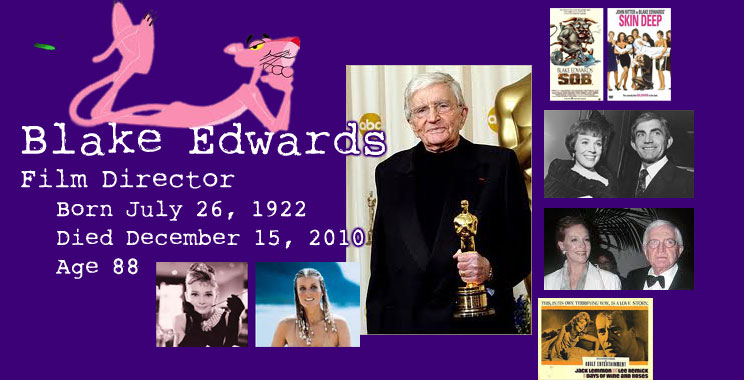 |
||||||||||||||||
Blake Edwards started his career as an actor during World War II, picking up small, usually uncredited parts in films such as Thirty Seconds Over Tokyo and the two Hargrove movies. He chafed under direction and decided to get into writing. After service in the Coast Guard, Edwards returned to Hollywood and shared an apartment with Mickey Rooney, who seems to have managed to live longer than anybody he ever worked with. Edwards co-wrote a Rooney musical, All Ashore, followed by a comedy called The Atomic Kid, a laugh riot about Rooney getting caught in a nuclear explosion. A little later, Edwards produced the TV series Mr. Lucky, Peter Gunn and Richard Diamond, Private Detective. The Gunn show was the first time Edwards worked with Henry Mancini, one of the 20th century's greatest composers. The Diamond series co-starred the legs of the otherwise unseen Mary Tyler Moore as Diamond's switchboard operator. Edwards fired Moore when her legs demanded more money. Then Edwards directed his first important feature, Operation Petticoat, a service comedy with Cary Grant and Tony Curtis. Breakfast at Tiffany's followed a couple of years later. Breakfast at Tiffany's shows its age in spots. There's Blake's old pal Mickey Rooney again, this time playing a caricature of a Japanese man that was probably an embarrassment even then ... but the film has got Audrey Hepburn, and it's got that song by Mancini and Mercer, and they will still be listening to that song aboard starships circling Aldebaran five hundred years from now. After Tiffany's came Days of Wine and Roses, a drama about alcoholism that was so effective that it even got Blake Edwards himself to stop drinking. And then there was The Pink Panther, which is a diamond and not a detective. The Pink Panther was lightning in a bottle. It had Peter Sellers in a small role as the bumbling but effective Inspector Clouseau. Sellers stole the movie from the real star, David Niven. The Pink Panther spawned four sequels with Sellers — five, if you count the stitched-together Trail of the Pink Panther — and three without. (A fresh series starting Steve Martin as Clouseau in two films is ongoing.) Edwards was married for 41 years to his second wife, Julie Andrews, whom he featured in a raft of films, TV specials and even a short-lived sitcom. Lots of junk in there, all right, but there are some gems, too: Victor/Victoria, 10, S.O.B., and the unfortunately neglected The Man Who Loved Women. Without Julie, Edwards made The Great Race, the terrific Sunset, and Skin Deep, which was so awful that the only thing to advertise about it was a scene that featured condoms that glowed in the dark. Indeed, Laurel & Hardy died too soon. Amelia, Garrett and Monarc are glowing as well, following their three-way split here. Five points for the hit and one for the trio. Total: 6. — Brad |
||||||||||||||||
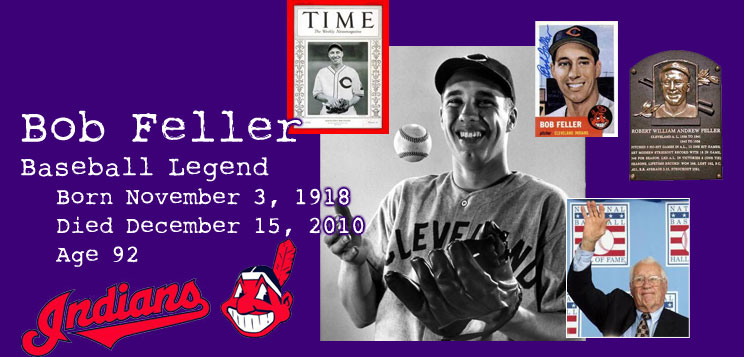 |
||||||||||||||||
There is an old joke among baseball memorabilia collectors:
If Bob Feller was anything in the last fifty years of his life, it was accessible. And another thing: At the age of 43, I got a hit off the Pride of Van Meter, Iowa. So here is my Bob Feller story. I started promoting sports memorabilia shows in the New York, New Jersey and eastern Pennsylvania areas in the early 1980s. The first show I did was one with Feller and Bobby Shantz. Both guys were great, but especially Bob Feller. Feller told everyone in line that he was signing for fans first. In other words, if you had a box of two dozen American League baseballs, like it or not, you were near the end of the line. I did three more shows with him. I didn't make a lot of money with him, but he was available and he loved to talk BobFellerBaseball. Still, I had to watch my language around him, which brings me to the hit I got off Bob's fastball ... It was in 1992. Bob was appearing (as a rep of the Indians) at Ainsworth Field in Erie, Pennsylvania to sign autographs. At that time, he would often throw a few pitches to a lucky ticket holder during the seventh inning stretch, so he was getting loose an hour or so before the game started, just playing soft-toss, when I showed up just to say hello because of all the shows we had done together. We (Bob, his wife Anne — whom he never seemed to be without — and me) were standing by the third base field entrance when he told me about the "lucky ticket holder" promotion that night. So I said, jokingly, "I can still hit you." Feller said, "Still? You could never hit me." But he wasn't joking. Here's the thing: Don't mess with competitive fire. Bob didn't mind tossing gravy to some schlub from the grandstand, but he wasn't going to do it for someone who dared him. I borrowed a bat from an outfielder named Willie Brown, and 72-year-old Bob Feller threw 72-year-old smoke at me. First pitch I lined for a base hit [1], second pitch was a soft fly ball to medium straight away centerfield. I yelled out to Bob, "That was a home run in some ball parks." "In Williamsport!" he shouted back. He still wasn't joking. He fired the next two pitches at my feet, thinking it was funny, me dancing, then he threw another strike, at which I swung and missed [2]. As I was walking toward Willie Brown to return his bat, I heard Bob Feller call me a name. I was shocked as I turned to Anne and asked, "Did he just call me an S.O.B.?" She kind of laughed and said, "No. I think he called you a son of a gun." When I looked back, Bob Feller was still not laughing. He was a terrific guy. He was funny — he never had a problem talking about how great he was — but he could be self-effacing, too. And he was always so polite ... until he heard someone in line cursing. He didn't have a problem raising his voice and pointing out there were youngsters in the room. I promoted shows with countless baseball and football players/Hall of Famers, and Bob Feller's kindness towards others, and his generosity of conversation, stand out. He was one of those people I thought so much of that I could never bring myself to add him to my deadpool list. He was a guy baseball will miss. DGH, Kixco and The Wiz, however, won't miss Rapid Robert. Instead, they will wallow in their points, two for the hit and another bonus point each. All right, they don't get to wallow that deep. Total: 3. [1] It was a line drive right at where the shortstop would play ... but there was no shortstop ... so for the rest of my life it goes down as a solid single. [2] In my defense, I was laughing too hard to really put a swing on the ball. — Bill Schenley |
||||||||||||||||
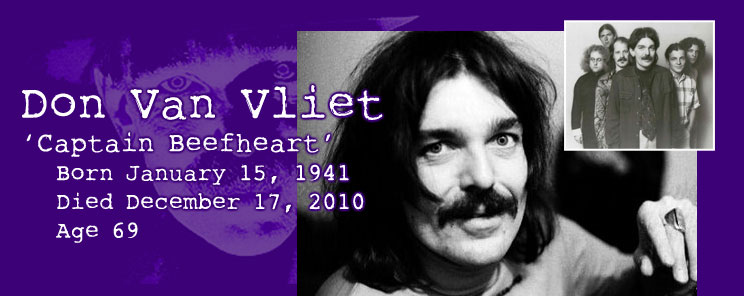 |
||||||||||||||||
What a way to end the year. An update and a poem. Doesn't get any better than this. Thank you, Jim Thornton, from the bottom of my heart. Whatever that means. Mo gets the solo, and it's a doozy. 11 points for the hit and 5 for the solo. Total: 16. * * * Don Van Vliet, aka the avant-garde musician Captain Beefheart, died on 17th Dec 2010, age 69. In any 1970's school, one lonely contrarian always owned and played the raucous and discordant double album Trout Mask Replica by Captain Beefheart and His Magic Band. Even enthusiasts agreed that it required several listens to "get," and it still sounded awful. I counted never having to listen to it again among the blessings of leaving school, and for 40 years it never entered my head — until Amelia asked me to "do him." But my wife claims to be a fan! Not the sort who ever played the record, or went to a concert, but the sort who says he was a "seminal musical influence." She says he was a forerunner of punk, and she is not alone — Amazon ran out of copies of Trout Mask Replica last week. Here are a few comments cribbed from Wikipaedia: Cartoonist Matt Groening said it "was the worst thing I'd ever heard," but "a double album cost a lot of money," so he played it again and again until he managed to convince himself "they were doing it on purpose." John Peel, a famous apologist for obscure acts, went for faint praise: "It could be described as a work of art." Another rock journalist claimed that it was "great played at high volume when you're feeling shitty, because you'll never feel as shitty as this record." Born Don Vliet, Beefheart grew up in the Mojave Desert and skipped most schooling, attending just enough to meet his partner in avant-garde rock, Frank Zappa. He sold vacuum cleaners door to door for a bit, but his hippie selling line "This sucks!" famously one day failed to interest the author Aldous Huxley. In the mid-'60s he created the Captain Beefheart persona and formed the Magic Band. They had a couple of small hits before Frank Zappa took him in hand and produced Trout Mask Replica. Reviewers went overboard — "the allegorical messages [...] are multiple, hidden by layers of abstractions that allow a cosmic-metaphysical interpretation, despite the author's pretence of illiteracy. These interpretations redirect the listener toward a form of apology for madness, to the primordial stages, and to chaos, counterposed against the monolithic order of technocratic society." To this day, authors of similar nonsense keep the record appearing on "greatest albums" lists. But it never sold much, follow-ups flopped, and his live audiences were always small. A YouTube video, Live in Cannes (1968), used suspiciously close camera work to cover up a crowd apparently in single figures. Soon the Magic Band rebelled; Vliet's claim that they were untrained when he met them, his failures to credit them, and allegations of brainwashing might have been forgiven, but not paying was serious. In the mid-'70s they quit, and Beefheart, reverting to his given name, went back to the desert and took up painting. At some point he developed the multiple sclerosis from which he eventually died. Although he richly deserved obscurity, even his dreadful music hardly justified that fate. But disease progression was slow, and he made a decent second living selling his abstracts to rich ex-fans. It turns out there is a lively market in art by pretentious ex-rock stars. Here's a poem. |
||||||||||||||||
Don Vliet and Frank Zappa The Don sold vacuums So he named himself Beefheart, Trout Mask Replica Most people still thought He played in Cannes So he returned to the desert The moral of this story is: If the critics once loved you, — Jim Thornton |
||||||||||||||||
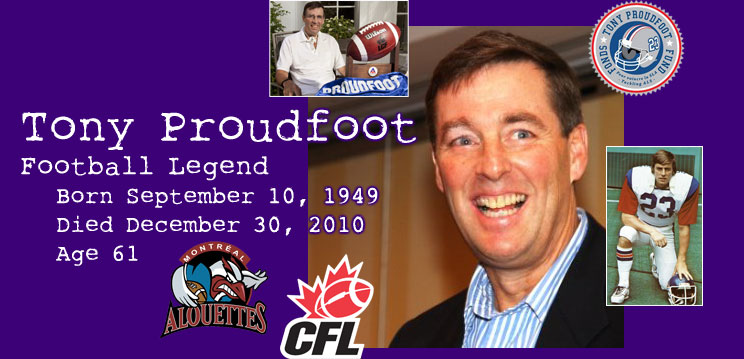 |
||||||||||||||||
The late Tony Proudfoot, who was 61 at the time of his death, had been a CFL All-Star defensive back and was a four-time Grey Cup champion (twice as a coach). Proudfoot was born in Winnipeg, Manitoba, and later moved to Pointe-Claire, Quebec. He attended John Rennie High School, graduating in ... Ya know ... Who gives a fuck ... The important thing is ... he died way too soon. About twenty-four hours too soon. Hey, Proudfoot, you let down a whole lot of people who were praying for you, had their fingers crossed for you. And I was one of them ... Why didn't you fight harder, Tony? Didn't you want to sing "Auld Lang Syne" one more time, or watch the ball drop as a horrifying Howdy-Doody-looking Dick Clark counted down, "Thhhhhhhherererereteeeeeeeen, ttututututututwellllllllllllllllllllllllllva, eeeeeeeeeelevvavavavavhuhuhuun, tatatatatatatatatatenenenene ...?" Well, what have you got to say for yourself? Oh, that's right, you're dead. You know what, Tony Proudfoot, you were no Lou Gehrig. Instead of the long line of Canadian football fans who held prayer vigils for the late football player/coach, teacher and broadcaster, or those of us who just wish ill-will on the dying, only Chipmunk Roasting gets points. She gets a hefty eeeeeeeeeelevvavavavavhuhuhuun points for the hit, 10 points for the end-of-year hit, and an additional five solo bonus points. Total: 26. — Bill Schenley |
||||||||||||||||
